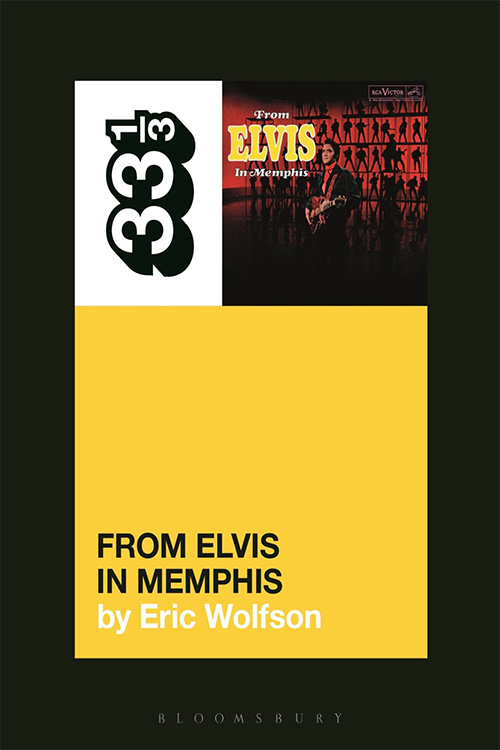Bloomsbury Academic has a series about ‘important’ albums: 33 1/3, highly praised by well known magazines like NME and Rolling Stone. Finally after 150+ items Elvis turns up in the list, thanks to author Eric Wolfons who jumped into probably one of Elvis’ best albums (if not the best): From Elvis In Memphis.
After a short praise for the book series, the dedication by the author and the contents the real content of the book starts with the track listing of the album, just plain and simple. The prologue handles the situation Elvis was in after the movies (From Elvis in Hell) and the resurrection through the NBC special. All together a nice short essay on Elvis’ life and career so far, obviously gained by a lot of research, seeing the used works.
The front cover of the album starts the look into the album From Elvis In Memphis itself. Every chapter from now on starts with an excerpt of an interview with Elvis, mainly from the 50s, but also some later ones. The cover chapter ends up in a short description of the TV special, before the decision to record in Memphis is explained, without choosing side of neither Lacker nor Klein. Chips Moman and the musicians are also introduced in this chapter.
Next up is ‘The Arrival’ that describes the first meeting of Elvis with Chips and the ‘Memphis boys’ and the recording of the first track ‘Wearin’ That Loved On Look’
The next chapters all handle the tracks in order, as said with parts of interviews, a lot of ‘Elvis history’ and background information on the songs and eventually previous recordings by other artists. Even some of the other songs recorded during the session - and not only the singles like ‘Suspicious Minds’ or ‘Don’t Cry Daddy’ - get attention.
I found no real nonsense in the book, as said it is obviously well researched, only a couple of unclarities, like the suggestions Elvis only started to use a drummer after going to RCA and Whole Lotta Shakin’ Goin’ is from 1971 (released yes, but recorded in 1970). Those being the worst ‘errors’ that caught my eye says enough about the quality (at least in my book). There are some parts that are not my piece of cake, about how Elvis felt or how Chips glanced, those things belong more in fiction. Then again it might exactly be the reason why this book is more than a dry list of facts and really gives reading pleasure.
After the musical content, the back cover is described where the biggest lack, the acknowledgement for the producer and musicians is explained as a sign of the time. Also the not so good relation with the Colonel gets some (more) attention, as does the weird RCA release policy.
The Epilogue (From Elvis In Paradise) handles the aftermath of the album and singles from the Memphis sessions.
Conclusion
I can do nothing else than highly recommend this neat piece of work. It has been a pretty long time since I enjoyed an Elvis related book as much as this one. A well researched work is worth much more than rehashing of (more or less) the same old pictures.

